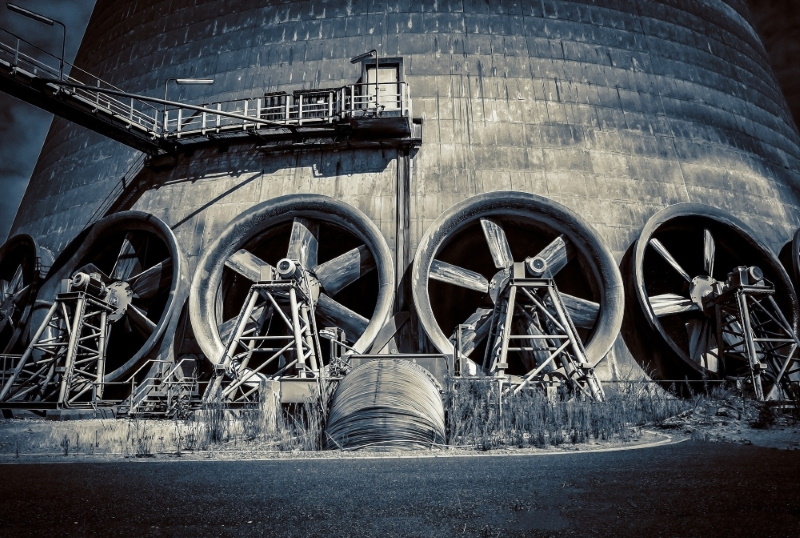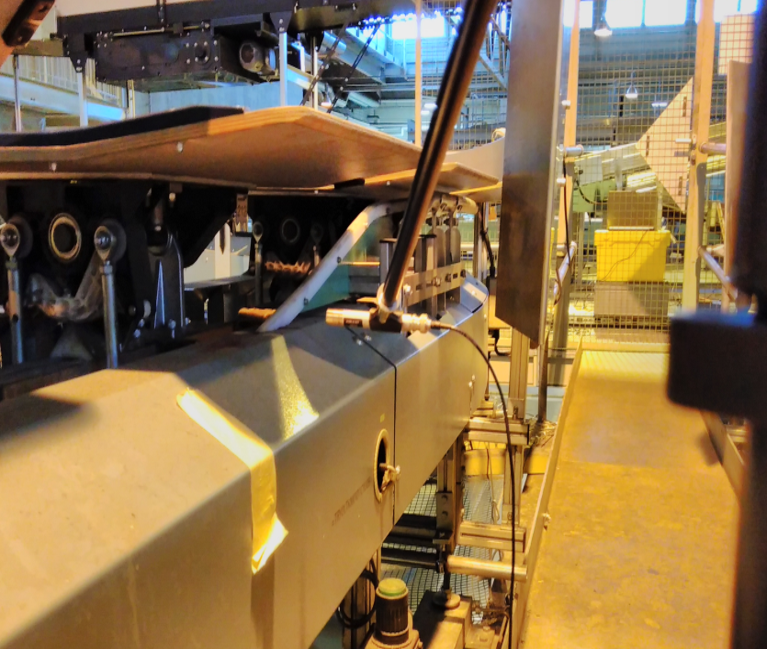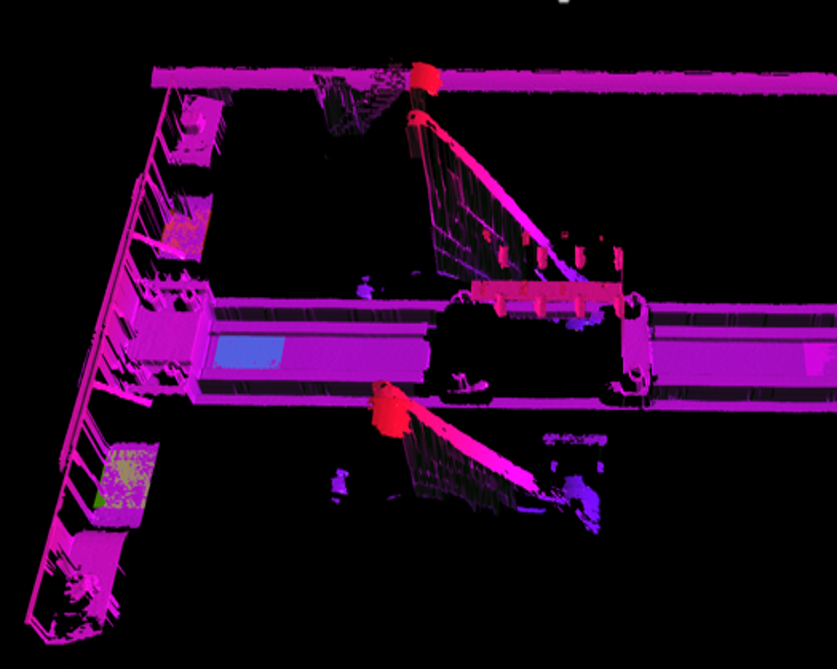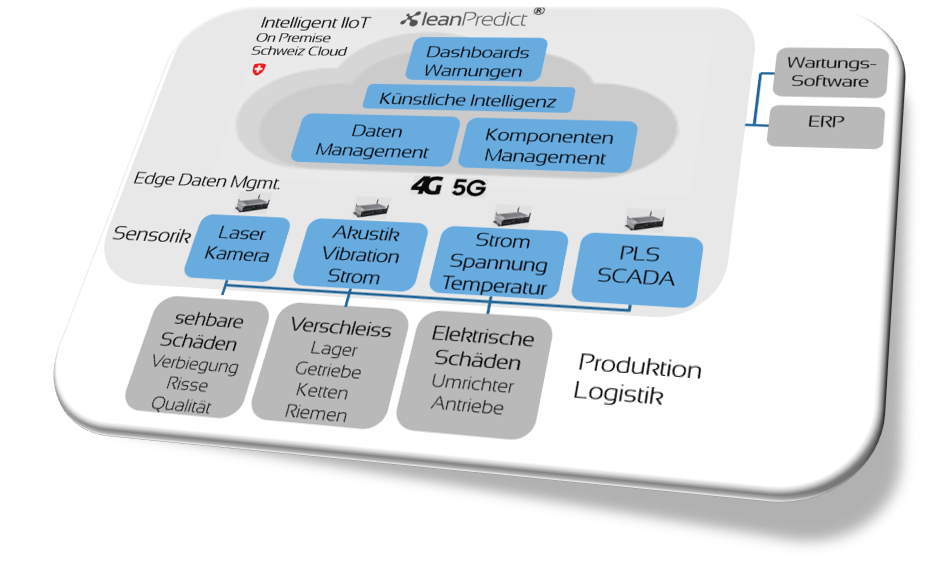In LeanBI, we invest in new solutions. We have been listening to our customers needs, and pursuing innovation with our IT, industry and Swiss university partners for years. Many innovation projects have resulted in our solutions, which can be adapted for our customers use cases with little project effort.
Most of our solutions can run either on your premises or on the cloud. We can also work together with your engineers to integrate them to your current infrastructure.
We also offer completely customized solutions to your problems, making our know-how available as a service provider. In that case, the end solution belongs to our customers.


With the plug & play vibration sensor technology of our partners and our data analysis solution we can detect damage to gears and rolling bearings.
We use state-of-the-art wireless but low-energy sensors, e.g. radio technology that has advantages over Bluetooth, and make sure to keep the energy consumption low by keeping the beacon in sleep mode unless anomalies are detected in the frequency profile.
Our solution provides analysis customized to your needs, like status reports and warning notifications automatically arriving to your mobile device. It is also possible to integrate the technology into the company’s own applications or to display warnings and trends on our dashboards, running on the cloud or on your infrastructure.

In a pilot project at the Swiss Post, we were able to successfully demonstrate the benefits of an acoustic solution for monitoring tilt tray sorting systems. Thanks to a single mounted sensor and our Deep Learning-based AI solution, we managed to assign a unique acoustic fingerprint to each of the approximately 900 trolleys in the facility, despite the numerous background noises in the sorting center. Changes in this fingerprint over time are a clear indication of damage, reducing costly service interruptions and extensive maintenance.
Acoustic sensors add value in many use cases. Successful implementation requires a holistic approach that includes sensor selection and placement, as well as data storage, processing, and security. This is the only way to generate meaningful insights through advanced machine learning algorithms. LeanBI has the expertise and experience to develop customized and successful holistic solutions for various use cases.

Many accidents and damages of logistic installations and machines are due to physical deformations of components. Vision systems are suitable for monitoring such systems.
Depending on the type of deformation we want to detect, we can choose between precise laser scanners, or more cost-effective camera systems. Typically laser scanners are needed for very small deformations in the sub-millimeter range, while for larger deformations of a few millimeters a camera can be used.
Typically deformations are treated as anomalies: we do not have many recorded damage cases to train classification models. Our AI solution does not require many known problematic cases for training. Running partly on the cloud and partly on the edge, it can deal with big data sizes to detect component deformations at an early stage.

Our deep-learning damage recognition solution can use all data types in the form of an image (out of cameras, laser scans, thermal cameras, aerial imaging, etc.). Either with pre-trained models, or models trained from your data, we can recognize various types of damages and automatize this time-consuming process that is still done manually. Applications include buildings, power poles, bridges, tunnels, roads or pipelines.
After digitizing damages and objects, we can combine them with information like geo-location, or timestamps so that we keep track of changes over time. We can also implement custom risk assessment and management procedures according to your case. Heavy deep-learning training runs on the cloud, but inference (using a trained model on your data) can also be done on premises, so we adapt to your use-case and keep costs low.
An example application of our solution is to automatically detect damages in tunnels for our client Amberg. Images taken by laser scanners are given to a deep network, specifically trained to recognize different types of damages (cracks, leakages etc.) or objects (pipes etc.).

Monitoring many types of machines should not mean having many separate systems and different dashboards for each of them. Having a centralized system to control all your predictive maintenance subsystems makes things easier, so that you do not have to maintain your maintenance systems.
LeanPredict is a modular end-to-end solution framework which covers all major applications of machine failures. It is equipped with various sensor types such as lasers, high-speed inspection cameras, acoustic, vibration, temperature sensors and others.
Data is analyzed on the cloud through an AI process that can detect anomalies at an early stage, before failures happen. LeanPredict provides information and prognostics over a dashboard and can send warning notifications directly to your cellphone or email.
Various systems such as MES, SCADA, PLCs, ERPs and maintenance solutions can also be connected via standard interfaces.